Neonatal Abstinence Syndrome occurs when a fetus is exposed to certain substances during gestation, leading to withdrawal symptoms in the newborn. This exposure can result from various reasons, such as maternal substance abuse or the use of prescription medications for pain management. At Rosenbery Maternal-Fetal Medicine, our team of fetal-medicine specialists is dedicated to providing specialized treatments to care for your newborn during this challenging time. Below, we’ll go into further detail about NAS, how it occurs, and what treatments can be provided.
Understanding Neonatal Abstinence Syndrome And How To Manage It
Neonatal abstinence syndrome is an umbrella term for a group of conditions; all caused when a baby withdraws from certain drugs they were exposed to in the womb before birth. The type of NAS your baby has will depend on the drug they were exposed to before their birth. While this condition most often refers to the newborn being exposed to opioids, it can also be caused by antidepressants, barbiturates, and benzodiazepines. You may also hear it as neonatal opioid withdrawal syndrome, and this definition is used when referring to the newborn’s addiction to opioids.
When you take drugs during your pregnancy, the drug passes through the placenta, feeding the baby alongside feeding them food and oxygen through the umbilical cord. This causes serious problems for your baby. While the symptoms appear different for every child, symptoms of NAS can include:
- Tremors and Jerky Movements
- Stiff Limb Movement
- Vomiting and Diarrhea
- Breathing Difficulties
- Skin Discolorations and Rashes
- Nasal Congestion and Sneezing
- Seizures
- High-Pitched Crying and Fussiness
- Fevers, Sweating, and Blotchy Skin
- Poor Feeding and Sucking
- Slow Weight Gain
All of these signs depend on what drug was used during pregnancy, how much of the drug was used, and how long i6t was taken. Your newborns’ reactions also depend on how your own baby breaks down the drug, and their reactions will depend on their gestational age at birth.
It’s crucial for mothers to receive appropriate care for their addiction and undergo a safe withdrawal process, and help their newborns manage and withdraw from the drug themselves. While it can be challenging, your pregnancy team and healthcare providers will be able to provide your newborn with treatments, including:
- Medications For Withdrawal: Your team will be able to provide them with medications to manage their symptoms and help them through their NAS over time.
- Hydration Through IV: When faced with symptoms such as diarrhea and vomiting, they will need fluids through an IV to prevent them from getting dehydrated.
- High-Calorie Baby Formula: If your baby has a low weight, then it will need a high-calorie baby formula to help them grow.
Learn More About NAS Treatment Through Rosenberg Maternal Fetal Medicine in Hewlett, NY/Suffern, NY
Our team of fetal-medicine specialists is here to support you through the challenges associated with NAS. Whether you are planning to conceive and need resources to overcome addiction or have already given birth, you can contact Dr. Victor Rosenberg at either Hewlett: (516) 501-9840 or Suffern: (845) 764-9880 for the assistance you need. We are committed to providing comprehensive care and helping you and your baby achieve optimal health and well-being.


